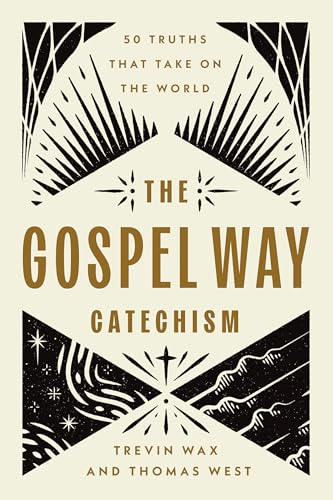Excerpt from The Gospel Way Catechism: 50 Truths That Take On The World by Trevin Wax and Thomas West. ©2025 The Gospel Way Catechism. Used with permission.
ANSWER
We see God by the light of his revelation, not by our imagination. God reveals his character and purposes through his Word and works.
THE ANCIENT PHILOSOPHER PROTAGORAS SAID, “Man is the measure of all things.” This old proverb seems like common sense to many people today. We set the standard. We determine morality. We reject the idea of a cosmic order to which we must conform, as if there could be one story of reality that must be true for all. Instead of looking to God to define the world for us, the individual constructs reality. This is an important aspect of the modern secular vision of life: we don’t find meaning out there; we create meaning in here. If people choose to believe in God, that’s fine because God is whoever we imagine God to be.
 Buy on Amazon
Buy on Amazon
The Bible points us in a different direction—toward God’s revelation of himself. And the Bible presents us with a choice: we can either seek to interpret the world through the story told in the Scriptures or through the story of self. These two visions are rivals, offering fundamentally different ways of understanding reality and human nature. They give different answers to questions about the origins of the world, the nature of humanity, the ultimate purpose of life, the source of moral values, and what happens after death.
The story told in the Scriptures begins with creation. The Bible tells us about God’s relationship with humanity, our fall into sin, redemption through Jesus Christ, and the ultimate restoration of all things. In contrast, the story of the self relies on natural causes to explain our origins. It emphasizes human autonomy and the notion that we can solve most or all of our problems through science and technology. The story of the self begins and ends with human reason. The story of the Scriptures begins and ends with divine revelation.
God is the center and point of everything. How do we see this God? How do we know him? The answer is twofold: through general revelation and through special revelation. General revelation refers to the work of God in creation. Look around at the world and you see something of God’s character and attributes. Creation bears his fingerprints. General revelation is wonderful, but it only takes us so far.
Special revelation refers to God’s Word (the Bible). We see God most clearly in how he reveals himself through his Word. It’s ultimately in Scripture where we come to understand who God is and what he has revealed about himself.
Over the centuries, pastors and theologians have leaned on the metaphor of spectacles or lenses to explain how the Bible functions. The Bible provides a framework or perspective through which we can understand reality, just as glasses or lenses help us see clearly. Only through the lens of Scripture can we truly understand and interpret the world and our experiences. We don’t merely look at the Bible but through it to understand our lives and the world we inhabit. The story of the Scriptures is the lens we use to see God and the world.
In the end, we know God because God has made himself known. We do not conjure up God as we’d like to imagine; we encounter God as he has revealed himself.
REFLECTION QUESTIONS
How does seeing life through the story told in the Scriptures differ from seeing life through the story of self? Reflect on Protagoras’s statement, “Man is the measure of all things,” and how this contrasts with the biblical perspective of God’s revelation as the ultimate truth. How does each perspective shape one’s understanding of reality and morality?
In what ways has the Bible provided you with a clearer understanding of God’s character and his purpose for your life? Consider specific instances in which Scripture has illuminated aspects of God’s nature or guided your decisions and actions. How has God’s Word helped you see beyond your perceptions and experiences?
How can you apply the metaphor of the Bible as spectacles to your daily life and decision-making?Consider how regular engagement with Scripture can influence how you interpret events, make choices, and interact with others. How does the study of God’s Word help you align your life closely with God’s will and purpose?
SCRIPTURE REFERENCES
Psalm 19:1-2
Psalm 119:18, 105
Isaiah 40:8
John 1:18
Romans 1:20
Colossians 1:15-16
2 Timothy 3:16-17
Hebrews 1:1-2
2 Peter 1:20-21
News Source : https://gcdiscipleship.com/article-feed/catechism
 Your post is being uploaded. Please don't close or refresh the page.
Your post is being uploaded. Please don't close or refresh the page.





